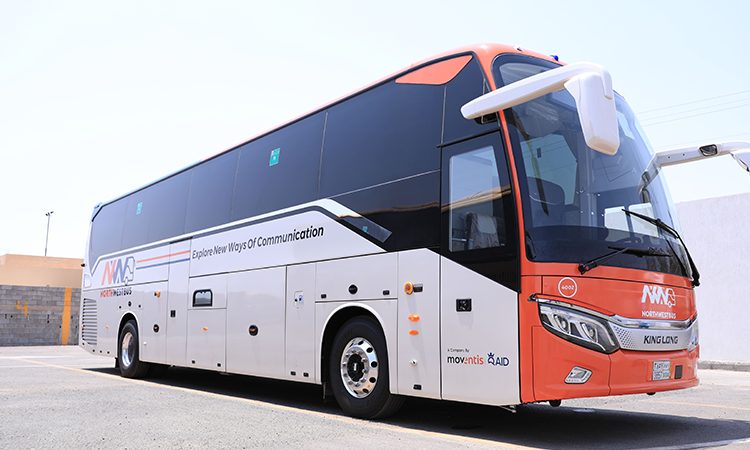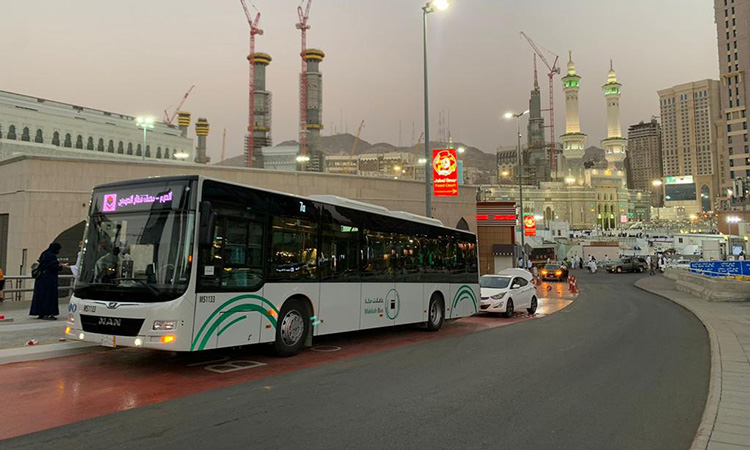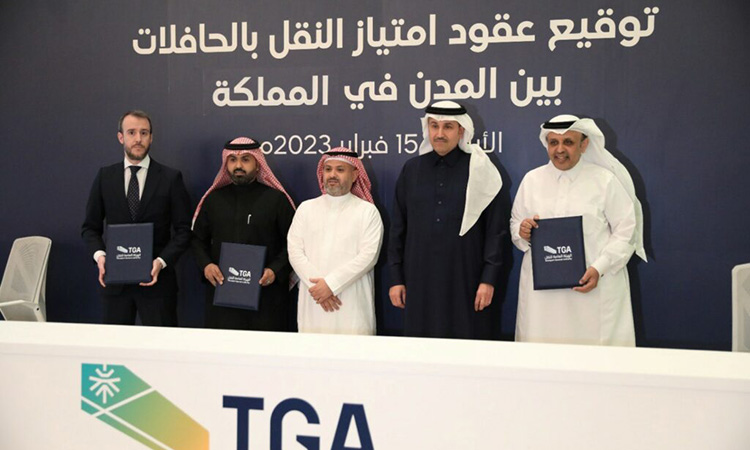Moventis’ strategic triumphs in expanding intercity transport across Saudi Arabia
- Like
- Digg
- Del
- Tumblr
- VKontakte
- Buffer
- Love This
- Odnoklassniki
- Meneame
- Blogger
- Amazon
- Yahoo Mail
- Gmail
- AOL
- Newsvine
- HackerNews
- Evernote
- MySpace
- Mail.ru
- Viadeo
- Line
- Comments
- Yummly
- SMS
- Viber
- Telegram
- Subscribe
- Skype
- Facebook Messenger
- Kakao
- LiveJournal
- Yammer
- Edgar
- Fintel
- Mix
- Instapaper
- Copy Link
Posted: 13 February 2024 | Josep M Marti - Moventis | No comments yet
Josep M Marti, Executive Vice President of Moventis, speaks to Intelligent Transport’s Halimah Haque about the strategic decisions, collaborative efforts and technological advancements that are driving the success of the company’s expanded intercity transport services in Saudi Arabia and beyond.


Credit: Moventis
Moventis has recently expanded its intercity transport services in Saudi Arabia, connecting 60 major cities. Can you elaborate on the strategic thinking behind this expansion, and how the company plans to meet the unique challenges of operating in such a vast network?
On 15 October 2023, we began our new operation in the northwest of the country, connecting some of the biggest cities in Saudi Arabia. These connections are important in linking all of the cities that are within the Red Sea corridor, from Jeddah to the north. It’s important to say that, between the biggest cities, there are other ways of travelling, like plane or rail – high-speed rail in the case of Madinah, Jeddah and Makkah – but with the other cities, the only way to travel via public transport is to take our lines.
To begin an operation like this almost from scratch saw us working in deep collaboration with a big partner in Saudi Arabia. We pooled together our experience”
To begin an operation like this almost from scratch saw us working in deep collaboration with a big partner in Saudi Arabia. We pooled together our experience: for Moventis, specifically our experience of operating a vast range of services, mainly in Spain, but also in other countries in Europe; and in the case of our partner, their experience in the Saudi market.
We finally bought the buses – 150 from Hong Kong, China. We have two kind of buses; approximately 15% of them have rows of three seats, and these are our luxury buses. The rest have four seats in every row, but are very comfortable, too. All of the buses are 12m long and equipped with very powerful air conditioning. That’s a basic thing, but understandably very important in Saudi Arabia.
We had hired all of our drivers and trained them, ensuring that they were fully prepared before operations began. Before our 15 October 2023 launch, our drivers undertook National Diploma courses in order to educate and train them, and allow them to become experienced with the service before transporting passengers.
So, when we began, we were prepared, and felt assured in the fact that we were able to check the times, the calendars, the schedules, everything, all before beginning service. From the first day, we had the control centre in order, with the geo-positional systems working and with all of the staff covered.
It’s a fantastic challenge. Naturally difficult, but a nice challenge. The application of technologies that we have available in our markets in Europe and Asia has contributed to our success.
Selling tickets through the website means that everyone is able to buy tickets, while we also have ticket offices in the most important places. We use the website as we do for our services in Spain, utilising the same technology. Our website is translated into English and Arabic and is working well.
I have to thank the efforts of the provider that we have here in Spain and our teams, both in Spain and Jeddah, that have made it possible. In the ticket offices and via our websites, we are increasing the number of passengers almost every day.
The new fleet of buses introduced by the company feature advanced technology, including the Mobileye Accident Detection system and a demand analytic system for route optimisation. How do these technologies contribute to the safety and efficiency of the transportation network, and what challenges were overcome during their implementation?
It’s a game changer for us at Moventis. Since the first moment of operation, we have been receiving real data, which we can monitor and analyse, showing us what is happening with all of our buses”
Well, it’s a game changer for us at Moventis. Since the first moment of operation, we have been receiving real data, which we can monitor and analyse, showing us what is happening with all of our buses. We also have cameras inside all of the buses, allowing us to watch every driver whilst they are driving. All of this data and these images are very important for ensuring safety.
It’s not only the Mobileye Accident Detection system that helps the driver in sounding alarms. If the system believes that the driver is fatigued, or is perhaps likely to fall asleep, then the alarms sound to provoke his response. The importance of this cannot be expressed enough. We also receive these alarms, and we can watch personally through the cameras to see what is going on and view the driver in that moment.
At the same time, we have been programming and utilising the latest technologies to plan and co-ordinate our entire service. The system enables us to organise the drivers: when they begin, where and when they start and finish their operations – all done so from Barcelona.
We’re utilising the technology of GIST, a Portuguese system which we have applied to all of our planning. We have applied the system to programme and to plan what a driver’s schedule will be up to 15 days in advance. In this way, we can calculate the periods of driving and resting; in turn, ensuring the comfort of the driver and safety of the driver and passengers.
As I mentioned earlier, this control comes from two places: the centre of control near Jeddah, where we have the depot, but we’re also connected from our headquarters in Barcelona. This double layer of control, where we double check everything, ensures greater efficiency and reduces risk of error. We utilise all of the communications and systems that we have at our disposal to work in a secure, safe and well organised way.


Credit: Moventia
With the capacity to transport 1.5 million passengers annually in Saudi Arabia, how does Moventis prioritise and enhance the overall experience for passengers, especially in terms of comfort, accessibility and customer service?
We need to always be mindful of the importance of bus design, as people will potentially be travelling on them for hours. Every coach has a toilet… I have even checked the air conditioning personally”
As I touched on earlier, we have been prioritising the design of the buses and following the advice of our partner in Saudi Arabia. Their company is known for their quality of service and is experienced in ordering coaches from China.
We agreed on how to prioritise comfort, safety and accessibility in the buses and in every aspect of the design, particularly when designing the whole system.
We need to always be mindful of the importance of bus design, as people will potentially be travelling on them for hours. Every coach has a toilet. I was there when we received the buses, and I can say that they are comfortable. The seats are not only comfortable – they are also clean and are reclinable. I have even checked the air conditioning personally.
The standards of quality are the same – perhaps even better, as it’s the latest technology – than in Spain, France or the UK. The level of quality is the best, as the entire fleet is new.
Customer service for our passengers is a priority, from the very first instant that they wish to travel and purchase a ticket. As such, we provide a user-friendly website, with an easy option to buy remotely. That being said, we have seen that a large percentage of people search the web and then go to the ticket office personally, as that is the culture in Saudi Arabia. But, first, they search our website to see the timetables, bus stop locations and so on. Therefore, clear information is very important for our passengers. From that very first instant, everything is in line, with all aspects of the journey provided to our high standards. When you arrive at the ticket office, it’s the same high level of customer service from the staff working there. Then, our drivers are also trained to follow this level of service, placing the passenger at the centre of our objectives.
Moventis has invested in a lot of cutting-edge technology and equipment, such as cranes and workshop vehicles. Could you shed light on how these elements contribute to the overall operational efficiency of the intercity transport network, ensuring timely maintenance and quality of service?
It’s key to mention that Moventis already has a functioning infrastructure like this in Catalonia. Our main objective is that all of the fleet is always ready and in a roadworthy condition”
These are invaluable tools that we are utilising from the very beginning. I have visited and seen the cranes and workshop vehicles myself. Naturally, with a new fleet, we don’t presently have or expect any major body or mechanical problems. That being said, a fleet of 150 buses will always have small things to repair, or small mechanical issues to maintain and, of course, lubricants need changing regularly and so on. In order to facilitate all of the normal maintenance of these vehicles across such a big area, we need vehicles that are specially equipped to provide maintenance for the whole fleet across the entire territory.
We aim to provide maintenance in the main depot, but in cases where we are unable to schedule this, we can send these special vehicles to repair the bus in real-time on the way. Normally, when we have a mechanical problem that stops the vehicle, we send another vehicle to replace it. Whereas now, as we permanently know their geographical position and the technical boxes of the buses are connected with our centre of operations, we are able to take the tools and the spare parts needed to repair the buses onsite.
I think it’s key to mention that Moventis already has a functioning infrastructure like this in Catalonia. Our main objective is that all of the fleet is always ready and in a roadworthy condition.
You’ve briefly touched upon how the company is committed to innovation in the urban mobility sector. Could you share any specific initiatives or projects that highlight Moventis’ dedication to driving innovation in this field?
The cameras that we have located in the buses – the ‘automatic eye’ – are important in preventing accidents and also in accident detection, as we know the location of the bus”
First of all, the cameras that we have located in the buses – the ‘automatic eye’ – are important in preventing accidents and also in accident detection, as we know the location of the bus. If something happens, the cameras allow us to analyse and research what has been happening.
There is also a small risk of collisions. In every service of buses, but especially in these services of long distance, fatigue could be an important factor. As I explained before, the systems to watch and alert the driver are so important for everyone’s safety.
We like discipline in our operations. We think that the quality of service is based on discipline, too, for everybody to follow the rules and to follow the processes.
You have to keep in mind that we are bringing drivers from other countries like Pakistan, India or Indonesia, for instance, and also from, perhaps, different cultures. Thus, they have to adapt to the infrastructures and culture of Saudi Arabia. They also have to adapt to the level of quality that we want to give.
We have simulators in Makkah, and here in Spain, to help the drivers know the routes before they experience work in real circumstances. In Spain, we have partnered with the Technological Institute of Castilla and Leon and Arisoft, for instance. And, in Makkah, with ACL, which provides the simulators. This helps to reduce the number of collisions and aids drivers in anticipating things that they may experience when driving in the city centre.
I have personally been training with the simulator in Makkah, and it’s really an interesting thing. These are a fantastic way to provide training for our drivers before, and then during, their job.
We also have to consider language. The drivers normally speak Urdu, while managers and middle managers speak Arabic and the big managers speak English. So, naturally, we have to translate.


Credit: Moventia
Celebrating over 100 million passengers since the launch of the city bus service in Makkah in 2022 is a really significant milestone. How does Moventis plan to build upon this success and continue providing seamless urban mobility solutions in Saudi Arabia?
We have moved a hundred million passengers in Makkah, because we are moving 200,000 people every day”
We have moved a hundred million passengers in Makkah, because we are moving 200,000 people every day.
When we began with the network, there was nothing there, in terms of public transport. When the new network was announced, there was still a question mark over how many people we would transport with public buses. Perhaps nobody would want to use them. Despite the level of analysis and planning, until you are putting buses into operation, it is always a case of praying that people will come.
Fortunately, since the first day, people have been travelling on our bus network. I’m pleased to say that it is a success, and we are still increasing the number of passengers that we are moving every day. It has been a very successful experience for the country and for the city. Our passengers are very proud of it, and we are proud of it in equal measure.
With projects spanning across the Middle East, Europe and Latin America, I imagine that each region must come with its unique challenges and opportunities. How does Moventis adapt its urban mobility solutions to suit diverse cultural, regulatory and infrastructural landscapes?
We have to be flexible. We have to learn how people are motivated, how people understand things, how people need to be trained and how to treat the people in different regions”
That’s a really interesting question. But I always say that, even between Barcelona and Girona (Girona is the other capital of province of Catalonia), we have cultural differences.
So, imagine the cultural differences that we have between Barcelona and Latin America, or with France, or moreover, with Saudi Arabia. We have to be flexible. We have to learn how people are motivated, how people understand things, how people need to be trained and how to treat the people in different regions.
However, the fundamental principles are the same everywhere. We need to provide a good, reliable service with clean, well-maintained buses. These are the basics. Then, how to motivate, how to teach, how to apply, how to write, will perhaps vary from place to place. Our programmes and technology are usually the same throughout our organisation.
Looking to the future, what specific innovations and technologies does Moventis foresee incorporating into its services to meet changing demands, enhance sustainability and shape the future of urban mobility globally?
Our challenge lies in how to treat and how to collect all of the information – the big data – that we have. How to treat this data in order to deliver a better service”
Moventis celebrated our centenary in 2023. My grandfather began the company in 1923. He was the first person to introduce innovation, as they brought the new combustion engines onto the streets. Before that, they used horses to move people.
In the years that followed, in 1990, we were one of the first companies to apply new software, actively working with other companies to develop it.
Now, we have to apply the intelligence. In fact, our challenge lies in how to treat and how to collect all of the information – the big data – that we have. How to treat this data in order to deliver a better service and to anticipate, in advance, the needs for every single trip. So, that’s a challenge, and these are the new tools that we have in our hands. Within the new contracts, indeed in all of our contracts, we are learning how to work with the new products of the latest technologies and how to apply artificial intelligence.
To be able to make good decisions, to take the decisions that these new technologies offer us – this is a very motivating new challenge that we have at Moventis.


Related topics
Accessibility, Alternative Power, Mobility Services, Passenger Experience, Public Transport, Sustainable Urban Transport, Vehicle & Passenger Safety
Related modes
Bus & Coach
Related countries
Saudi Arabia, Spain
Related organisations
Moventia Group, Moventis
Related people
Josep M Marti







